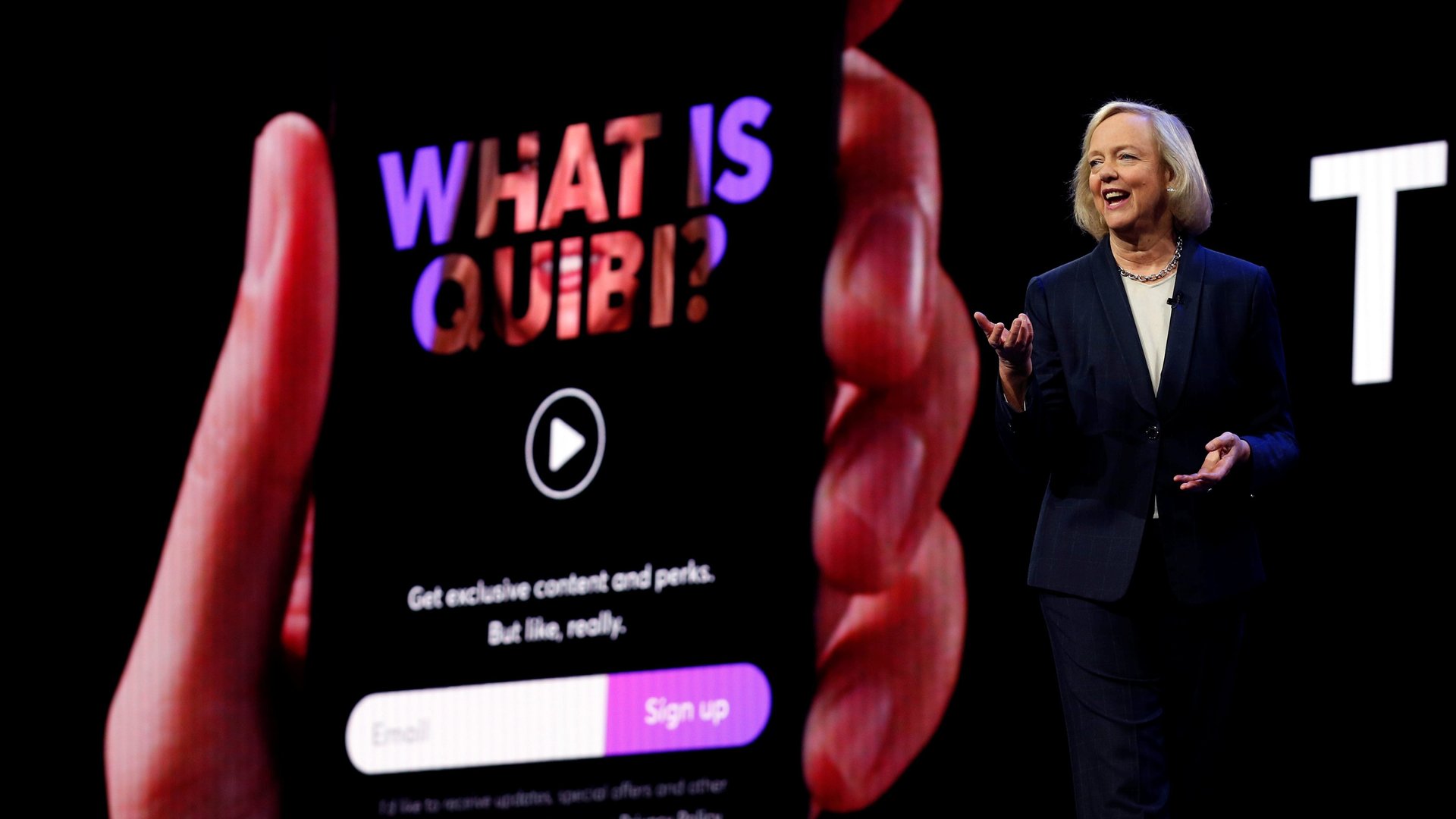Quibi knows you have no idea what Quibi is
Quibi has three months to teach consumers what it is—and why they should buy it—before its launch.


Quibi has three months to teach consumers what it is—and why they should buy it—before its launch.
The upcoming mobile streaming service, debuting April 6 in North America, aired its first national ad in the United States during the Super Bowl last night, attempting to add its quirky name to the cultural lexicon. “I’ll be there in a Quibi,” radios the getaway driver for a bank heist as his partners wait for pickup. “A what?!” one of them asks. “A Quibi,” the driver replies, “less than ten minutes.”
Quibi’s pitch is that its content can be consumed in short, easy spurts on the go, while still boasting Hollywood-level production and A-list talent. (The made-up word is a portmanteau of “quick bites.”) Available only on phones, the app will stream a variety of shows to subscribers, from a reality series hosted by Chrissy Teigen to a horror anthology show created by Steven Spielberg.
No matter the genre or format, all episodes will be 10 minutes or less. Subscribers can get the service for $5 per month with ads, or $8 per month without them.
The $5.6 million for 30 seconds of Super Bowl ad time was a small price to pay for Quibi, which has secured more than $1 billion in funding from companies like Disney, WarnerMedia, and Alibaba. Its founder, Jeffrey Katzenberg, used to run Disney’s film studio in the 1980s and early 1990s. Its CEO, Meg Whitman, once served in the same position at both Hewlett Packard and eBay.
Quibi’s leadership reflects its blend of Hollywood and Silicon Valley. In addition to its roster of well-known entertainers, the service created a new patent-pending video technology called “Turnstyle” that it hopes will change how stories are both made and also viewed.
But hardly anyone knows this yet. After the Super Bowl ad aired, Twitter was filled with reactions from viewers saying they still didn’t really get what, exactly, Quibi was. “We have to build a brand—no one’s heard of Quibi—and we have to build the use case,” Whitman said at the 2020 Upfront Summit in Los Angeles last week.
In the age of media stalwarts like Netflix, Disney, and HBO, starting a brand from scratch is an immense challenge. Competing with those companies for viewers’ attention is an even bigger one. (Quibi’s leadership team insists that, due to the unique nature of its app and programming, it is not actually competing with these other companies in the “streaming wars.”)
Quibi is not alone in this endeavor. Even the legacy media companies launching new streaming services this year have to answer questions surrounding their brands before they go to market. NBCUniversal hopes its streaming platform is the first thing you think of when you hear the word “Peacock,” instead of those creepy birds with the big, colorful feathers. Its website is currently ranked behind the bird’s Wikipedia entry on Google search, while seven of the nine results on the first page are for the bird.
WarnerMedia, meanwhile, still has to help audiences understand how its upcoming streaming service, HBO Max, is different from HBO Now, HBO Go, regular HBO, and Cinemax. There is already some evidence suggesting consumers are confused by all the HBO-branded platforms. Apple has a similar problem with its streaming service, Apple TV+, which is not the same thing as Apple TV (a device), or Apple’s “TV” app (the app in which Apple TV+ lives).
What makes Quibi’s challenge more imposing than the rest is that it doesn’t have a vast library of popular existing content to fall back on. Peacock’s prospects are boosted by the service’s exclusive access to beloved sitcoms like The Office and Parks and Recreation, in addition to all the other content across NBCUniversal’s film and TV studios. HBO Max, meanwhile, will have Friends, The Big Bang Theory, and South Park.
While not as impressive, Quibi’s cupboard isn’t completely bare. Among its more modest list of intellectual property is a revival of the hidden-camera reality TV series Punk’d, which aired on MTV in the 2000s. Hosted by Chance the Rapper, the Punk’d revival is the one show Quibi chose to highlight in its Super Bowl ad. For the time being, that’s probably an easier way to get people interested than explaining what a Quibi is.